 |
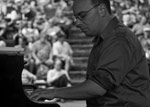 Ted Firth 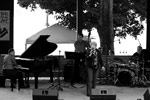 Ted Firth Trio & Marilyn Maye 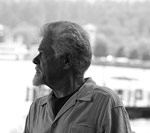 Roswell Rudd 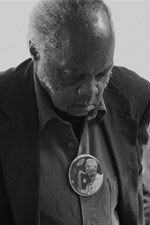 Henry Grimes 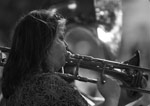 Debra Weis 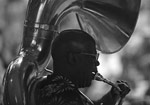 Joe Daley 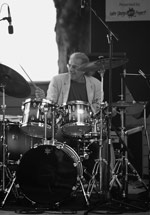 Barry Altschul 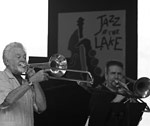 Roswell Rudd & Steve Swell 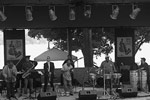 Pucho & His Latin Soul Brothers 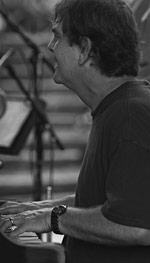 Chip Crawford 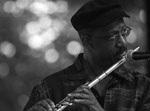 Patience Higgins 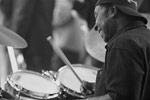 Tyrone Govan 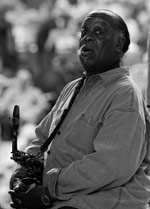 Ed Pazant photos by Albert Brooks click here for more |
LAKE GEORGE JAZZ WEEKEND (Day 1) (feat. Marilyn Maye & the Tedd Firth Trio, Roswell Rudd & Shout, Pucho & His Latin Soul Brothers, and Andy Narell) Shepard Park Lake George, NY September 13, 2008 by Tom Pierce Knowledgeable Jazz festival program coordinators are always eager to present musical diversity and also an exciting opening act to energize the audience. Paul Pines, who has been bringing in artistically stimulating groups to the Lake George Jazz Festival for its 25 year existence, surely scored “big time” on both counts in its Saturday afternoon segment. Vocalist MARILYN MAYE is a name familiar to serious lovers of sophisticated singing, as well as casual fans who caught many of her record (76) appearances on Johnny Carson's Tonight show. For the last few years she's been accompanied by renowned pianist Tedd Firth, originally from Hudson Falls and now heavily in demand in the New York metropolitan area. His trio with bassist Tom Hubbard (veteran of numerous instrumental and vocal recordings & live performances) and drummer Jim Ecklof of Kansas City (Ms Maye's percussionist for 47 years) was a huge asset. They jump-started things at 1 PM with a driving uptempo version of a tune, “Sunday”, that Firth explained he always liked when sung by the legendary Carmen McRae. A more deliberate, but gently syncopated version of “I've Never Been in Love Before” (from “Guys & Dolls”) followed. They closed their introductory segment with a torrid take of “What a Little Moonlight Can Do” which clearly showed that in addition to his reputation as an invaluable accompanist to vocalists, Firth has a stirring dexterity as a jazz soloist. Maye's entrance at that point with an energetic, but very poised interpretation of Andre and Dory Previn's “You're Gonna Hear From Me” immediately displayed the obvious sense of command she has on stage. This was then further exemplified with a striking, tour-de-force medley of “You” songs, including “Here's Looking at You”, “I Concentrate on You”, “I Get a Kick Out of You”, “I've Got You Under My Skin” and “All of You”, plus several others. Her facile changes in tempo and subtle ability to inject just the right amount of drama skillfully avoided any of this extended number coming across as a gimmick. Her engaging stage presence was also demonstrated while introducing her masterfully phrased rendition of Billy Strayhorn's unforgettable “Lush Life”, which she sang at the Metropolitan Room in Manhattan, where she noted that it was an example of the torch songs that showed “People are happiest when they're drinking and crying”. A somewhat playful, but intensely moving version of “Just For A Thrill” (from her “Maye Sings Ray” CD) showed her respect for Mr Charles' classic performance of this on his extraordinary 1959 album, “The Genius of Ray Charles”; but was delivered with her personal approach, including a slightly faster tempo. Other selections, such as “Let There be Love”, “Pick Yourself Up” and “Mountain Greenery” all exhibited the appealing qualities of this multi-faceted vocalist, whose stylistic range comfortably encompasses Jazz, Pop & Musical Theater. Those in the audience, who primarily focused on pure vocal skills, were appreciative of her resonant, clear tone supported by strong breath control and consistent intonation, despite the creative phrasing chances she occasionally took, that made her performance enormously interesting. For Jazz fans, perhaps most impressive was her and the trio's adept handling of the difficult 5/4 rhythm of “Take Five”, written by saxophonist Paul Desmond, for another truly classic 1959 album, the Dave Brubeck Quartet's “Time Out”. It would be admirable for a vocalist of ANY age to display the qualities of Marilyn Maye, in addition to connecting so vibrantly with an audience. But it was even more eye-opening, when one reflects on the fact that she turned 80 earlier this year. In Trombonist ROSWELL RUDD, the festival presented another veteran who has earned the respect of many in the music world for more than 5 decades. Since graduating from Yale in 1956, his journey through Jazz has included Dixieland, Avante Garde free music (with Archie Shepp and others), and various forms of World-influenced music and at this festival, his Trombone Shout band. This interesting aggregation, formed in 2004, with an initial performance in Mali, in the Sahara Desert, included 3 trombones (Rudd, Steve Swell and Debra Weisz), tuba (Joe Daley), bass and drums. The last two were played by Henry Grimes and Barry Altschul, like Rudd early pioneers in free music. It essentially is a modern day version of a music form occasionally played in traditional Black churches, with a strong New Orleans and Dixieland feel. But it also has a decidedly Jazz orientation in its swing, improvisation and blues attributes. Despite the past Avante Garde involvement of Rudd, Grimes and Altschul and the fact that all eight of the tunes played were originals, the music was a good deal more melodic and accessible to fans of more straight-ahead Jazz than one might suspect. This may have been partly the result of its being rooted in New Orleans and the Pentecostal tradition, as well as avoiding, for the most part, the atonality and dissonance one associates with “Free” Music. While the various tunes were certainly adventuresome, (melodically and harmonically), with plenty of surprises in the way the lines were built and ultimately resolved, the overall feel was still quite musical. I personally found the ensemble support, the call & response phrases, as well as the occasional counterpoint techniques used between the 3 trombones and tuba quite soulful, spirited and pleasantly reminiscent of some of the work of Charles Mingus whose compositions often featured trombones. I also appreciated the lack of overly long solos. However, some attendees noted a certain degree of sameness, song to song, partly due to the deep, heavy sound of the three trombones and tuba, with no higher pitched instrument (trumpet, alto sax, etc) or chord playing instrument (piano or guitar) to provide more tonal variety. But certainly, the instrumental prowess of Rudd, Swell and Daley in particular, as well as Henry Grimes (including switching from bass to play an enjoyable violin solo) was all acknowledged. It will be interesting to see over time if Rudd gets sufficient attention and opportunities to perform with this unique and passionate band, to see it continue to evolve and hopefully get to record. The last of the senior veterans presented that afternoon was 70 year old timbales player from Harlem, HENRY LEE BROWN, with his band, PUCHO & HIS LATIN SOUL BROTHERS. Brown, who made a point to clarify that he is actually Black, and adopted the name “Pucho” at the age of 12, to facilitate obtaining gigs playing Latin Jazz. He has been a successful bandleader, combining Jazz, Latin, R&B/Soul and James Brown type Funk for 50 years. Although his records and performances were always geared toward commercial acceptance, a consistently swinging groove was generated by his timbales, along with congas, bongos, cowbells, bass, drums and swinging pianists, like a very young Chick Corea in the early 1960's and Chip Crawford at this festival. Their program of songs included an infectious version of Herbie Hancock's “Cantelope Island”, Duke Ellington's “Caravan” with some moving passages by saxophonists Ed Pazant and Patience Higgins, a Be-bop and Mambo influenced version of Miles Davis' “Milestones”. He also changed pace with an interesting treatment of “A Very Good Year” that was part vocal & part narration by Brown with just piano, bass and drums. Although this particular number, done as a simulated conversation with his 11 year old grandson, was at times a touching and seamless transition to passages in this Sinatra-identified classic, the spoken part was just a tad too lengthy. The band also did a punchy rendition of James Brown's “Sex Machine”, with a long, funky, electric bass solo, as well as Leonard Bernstein's exquisite composition “Some Other Time”, as a ballad with some effective sax and trumpet solos. All in all, Brown demonstrated what the band was about, to the point of convincing some in the audience to buy some of the CD's on sale. I was not able to stay for the 8 PM performance of famed Steel Drum virtuoso Andy Narell. But based on the three distinctive afternoon acts, all of whom performed with élan and consummate musicianship, kudos are again in order to Paul Pines for the effort he put in to come up with this program, as well as to all those involved in presenting 25 years of creative and diverse music. Tom Pierce has had a burning passion for Jazz for over 45 years, initiated and fueled by seeing live in New York City, starting in the early 1960's, virtually every major artist still performing. He's been very happily living in Guilderland the last 5 years, as an active retiree sharing his love of music by writing online reviews for a number of web sites, preparing DVD presentations to various groups, co-Hosting Radio programs showcasing his favorite artists and busily supporting A Place for Jazz and the SwingTime Society in a variety of way |